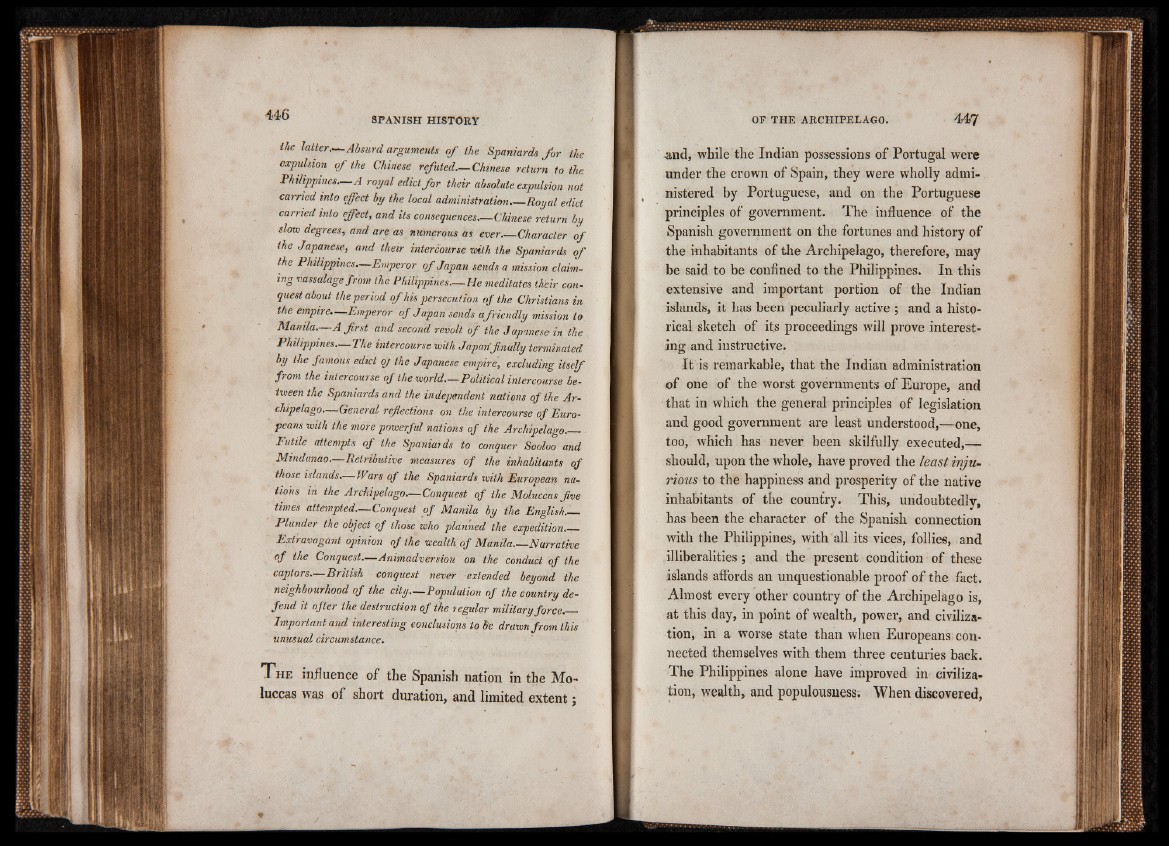
the latter— Absurd arguments of the Spaniards fo r the
expulsion of the Chinese refuted.— Chinese return to the
Philippines.— A royal edict fo r their absolute expulsion not
carried into effect by the local administration.— Royal edict
carried into effect, and its consequences— Chinese return by
slow degrees, and are as numerous as ever Character of
the Japanese, and their intercourse with the Spaniards of
the Philippines.—Emperor o f Japan sends a mission claiming
vassalage from the Philippines— He meditates thHr conquest
about the period of his persecution of the Christians in
the empire.—Emperor of Japan sends a friendly mission to
Manila.— .A first and second revolt of the Japanese in the
Philippines— The intercourse with Japan'finally terminated
by the famous edict of the Japanese empire, excluding itself
from the intercourse of the world— Political intercourse between
the Spaniards and the independent nations of the Archipelago—
General reflections on the intercourse of Europeans
with the more powerful nations of the Archipelago____
Futile attempts of the Spaniards to conquer Sooloo and
Mindanao— Retributive measures of the inhabitants of
those islands.— Wars of the Spaniards with European nations
in the Archipelago.— Conquest of the Moluccas Jive
times attempted— Conquest of Manila by the English.—
Plunder the object of those who planned the expedition.—
Extravagant opinion of the wealth of Manila Narrative
of the Conquest— Animadversion on the conduct of the
captors.— British conquest never extended beyond the
neighbourhood of the city— Population of the country defend
it after the destruction of the regular military force.__
Important and interesting conclusions to be drawn from this
unusual circumstance.
T he influence of the Spanish nation in the Moluccas
was of short duration, and limited extent;
■and, while the Indian possessions of Portugal were
under the crown of Spain, they were wholly administered
by Portuguese, and on the Portuguese
principles of government. The influence of the
Spanish government on the fortunes and history of
the inhabitants of the Archipelago, therefore, may
be said to be confined to the Philippines. In this
extensive and important portion of the Indian
islands, it has been peculiarly active ; and a historical
sketch of its proceedings will prove interesting
and instructive.
It is remarkable, that the Indian administration
of one of the worst governments of Europe, and
that in which the general principles of legislation
and good government are least understood,—one,
too, which has never been skilfully executed,—
should, upon the whole, have proved the least injurious
to the happiness and prosperity of the native
inhabitants of the country. This, undoubtedly,
has been the character of the Spanish connection
with the Philippines, with all its vices, follies, and
illiberalities ; and the present condition of these
islands affords an unquestionable proof of the fact.
Almost every other country of the Archipelago is,
at this day, in point of wealth, power, and civilization,
in a worse state than when Europeans connected
themselves with them three centuries back.
The Philippines alone have improved in civilization,
wealth, and populousuess. When discovered,